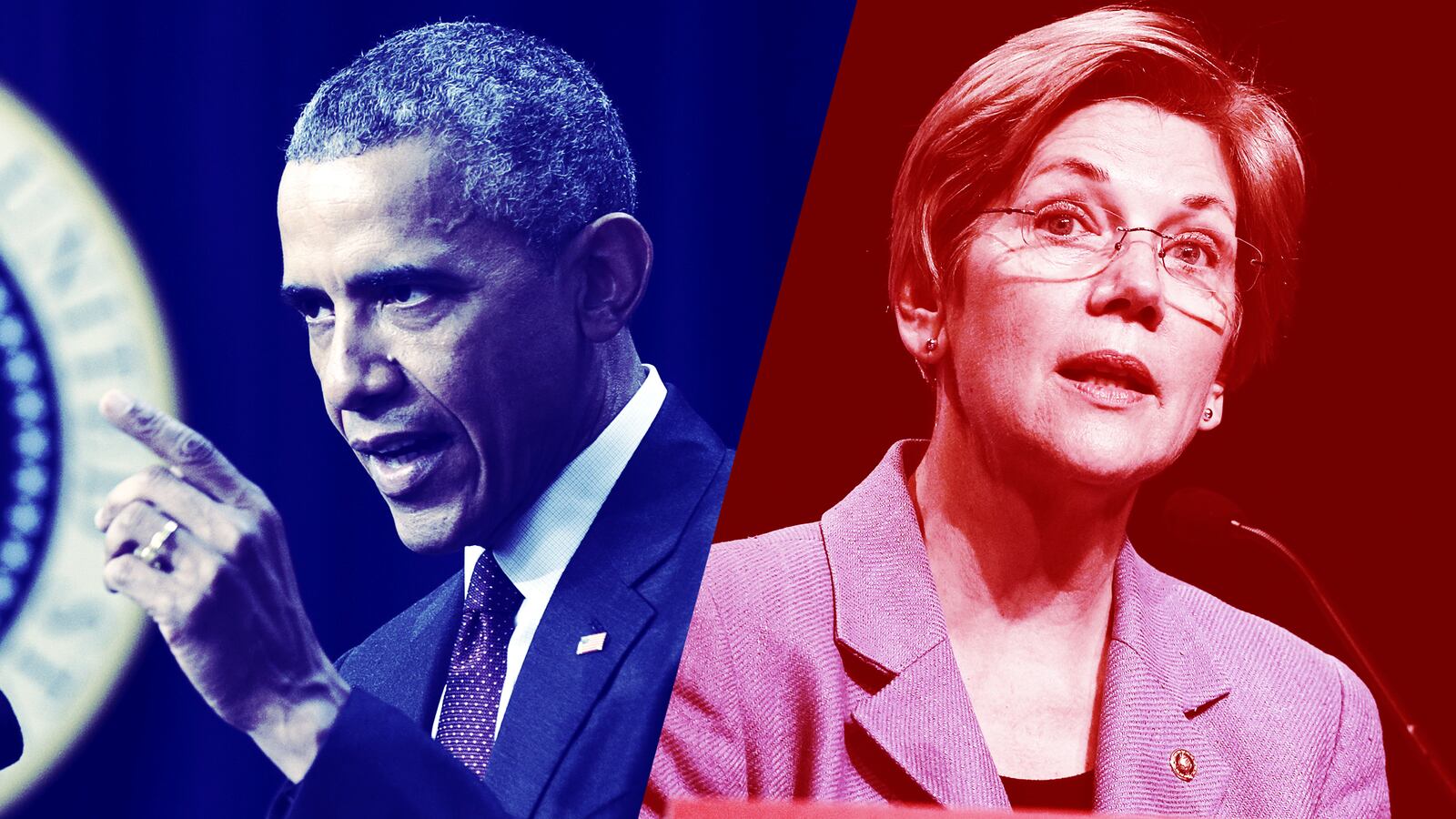The rhetoric is heating up between Democrats as the Senate prepares to vote on giving President Obama “fast-track” authority to negotiate a sweeping trade deal that a wide swath of his party and labor base oppose.
Democrats led by Senator Elizabeth Warren are denouncing the emerging deal and the secrecy surrounding the negotiations. Warren upped the ante last week when she claimed a little-noticed provision in the emerging trade deal, the investor-state dispute settlement (ISDS), could be used by corporations to undo Dodd-Frank, the financial regulatory legislation that is one of Obama’s major achievements.
The president, meanwhile, says Warren’s criticism is baseless. “Think about the logic of that, right?” Obama asked his audience at Nike headquarters near Beaverton, Oregon on Friday. “The notion that I had this massive fight with Wall Street to make sure that we don’t repeat what happened in 2007, 2008, and then I sign a provision that would unravel it?” he said. “I’d have to be pretty stupid.”
Obama continued his war on Warren through the weekend, reminding Democrats that she doesn’t walk on water, that she’s a politician. Warren, he insists, is fighting an old fight going back to NAFTA, a free trade agreement signed by President Clinton in 1994.
“He should have done this long ago,” says Jim Kessler, a founder of Third Way, a centrist Democratic group that is pro-trade. “He’s allowed Democrats to take a two-by-four to his signature economic achievement of his second term, which is to expand exports in the biggest market of the world, Asia. He needed to treat these attacks on it as though Ted Cruz were making them. Instead, he made it feel like if you’re a Democrat you can say anything and he’s not going to care.”
Warren evidently crossed some line in Obamaland when she suggested the Trans-Pacific Partnership (TPP) deal would give corporations free rein. The investor-state dispute settlement (ISDS) is a standard feature in all trade deals, but it can be made to sound pretty scary.
ISDS allows companies to sue host countries in special ad hoc tribunes. Phillip Morris is currently using ISDS to challenge regulations in foreign countries on packaging cigarettes with prominent health warnings that might discourage sales. Corporations have won in other countries, but never in the United States. “The ISDS argument borders on silly,” says Kessler. “We’ve never lost a case and nothing will happen to Dodd-Frank.” Warren’s argument is “as off-base as death panels,” he says, a comparison that Obama also makes.
Warren punched back in an interview with NPR airing Tuesday pointing out that American courts would not be the deciders, that “private corporate lawyers who get paid by big corporations to sit and decide” would be the arbiters. “And let’s be clear, once those private corporate lawyers make a decision, there is no appeal.”
Warren’s ability to elevate an issue is unparalleled in today’s Democratic Party, and rank-and-file Democrats already don’t like trade deals. They cost jobs, liberals argue, and most Democrats will vote against whatever treaty emerges. If Obama succeeds in getting fast-track Trade Promotion Authority (TPA) from the Congress, lawmakers would then give up their right to amend the agreement and would vote up or down on the final deal.
The Senate vote could come as early as Tuesday. Seven Democrats supported trade legislation in committee and another seven or eight are either there or gettable. Republicans broadly support the deal, however, and even if a few defect the legislation would still get the 60 votes needed to pass.
The House is tougher. Speaker Boehner and most Republicans are free traders and want to get this deal done. But Boehner needs thirty Democrats to join the GOP to reach 218, and they’re not there yet.
Keeping a tight lid on these trade negotiations is essential to getting a deal in a fractious political climate, but it has also fueled suspicion among Democrats about what corporations may be getting at the expense of workers. The evolving treaty is heavy reading, and only a small number of lawmakers other than the earnest Warren, who lives and breathes these issues, have done their homework. The material is classified; members can’t take notes, and staffers with security clearances can have access but must be accompanied by a member of Congress.
This is standard procedure in trade deals, but in Warren’s hands the secrecy has taken on a life of its own as more evidence of a system rigged against workers. Democrats from industrial states don’t complain so much about secrecy or the ISPS provision; they just point to the history of trade deals and the hundreds of thousands of American workers who have been displaced when companies out-source their factories. Nike has a million workers abroad, a third of them in Vietnam, and promises that if the Trans-Pacific Partnership (TPP) is passed, they would create 10,000 new jobs, with an additional 40,000 in its supply chain.
This does not impress Pennsylvania Senator Bob Casey, a Democrat, who told the Daily Beast that after so many false and broken promises on trade, “There’s a basic difference of opinion in how this turns out in the end.” He cites the trade deal with South Korea that passed Congress during Obama’s first term. He argues that, while South Korea has gained $12 billion in trade from the deal, the U.S. has only gained $1 billion.
Third Way makes the counter argument that of 17 trade deals completed since NAFTA, 13 have benefited the United States. And unlike NAFTA, the TPP includes within the treaty supposedly enforceable standards on labor and the environment. Either way, this is a tough fight for the White House. Win or lose, there will be bruised feelings among people Obama called his “fellow travelers.”
But hey, this is politics. “Democrats are pretty good at fighting, and we’re not bad at making up either,” says Casey. “This is a good fight to have.”





